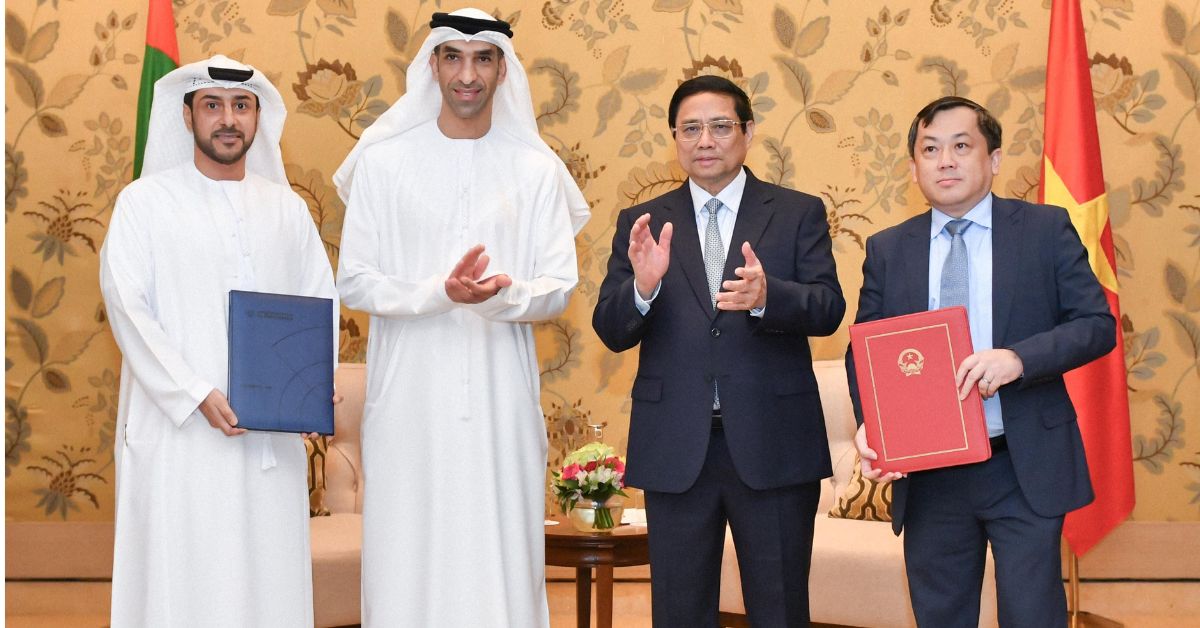ABU DHABI — The UAE’s Comprehensive Economic Partnership Agreement program (CEPA) experienced exponential growth in 2023, with three deals implemented, two more signed and awaiting implementation, and four agreed upon – bringing the total number of CEPA partners since the program’s launch to 10 across four continents, said Dr. Thani Al Zeyoudi, Minister of State for Foreign Trade.
This represents a significant expansion of the UAE’s foreign trade network, promising to create more opportunities for the country’s private sector in some of the most dynamic economies in the world.
Over a pivotal year for trade, the UAE’s CEPAs with Türkiye, Indonesia, and Israel came into force, removing or reducing tariffs, eliminating trade barriers, and opening up market opportunities for exporters and investors.
Furthermore, CEPAs were signed with the emerging economies of Cambodia and Georgia, both set to be implemented in the first half of 2024, while terms were also agreed for CEPAs with South Korea, Colombia, Mauritius, and Congo-Brazzaville.
The UAE commenced CEPA negotiations with several other countries, including Serbia, Ukraine, Eurasia, Australia, the Philippines, Malaysia, Costa Rica, Kenya, Chile, and Vietnam. The CEPA program, which includes the partnership with India enacted in May 2022, is projected to increase the UAE’s exports by 33% and contribute more than AED153 billion to the national GDP by 2031 – a growth of almost 10 percent from 2022.
Dr. Al Zeyoudi also noted that the flagship CEPA program has secured access to markets accounting for nearly 2 billion people, a quarter of the world’s population, and will deliver long-term benefits to the UAE economy.
“Trade has always been important to the UAE, a bridge connecting our products, skills, and natural resources to the world, infusing our economy with its latest ideas and innovations. As underlined by the ‘We The UAE 2031’ vision, trade is now a cornerstone of our economic development and diversification ambitions.
“In the past 12 months, trade has become a record-setting driver of growth, a pillar of economic policy, a linchpin of foreign relations, and, at the recently concluded COP28, a new front in the battle against climate change.
“Trade is now a central component of the UAE’s domestic success and, as we prepare to host the World Trade Organization’s 13th Ministerial Conference in February, it is also a growing international influence. As we reflect on the achievements of the past year, we believe the UAE has the conviction and credibility to help shape a new future for global trade,’ Al Zeyoudi said.
He also highlighted that in the first half of 2023, the UAE’s non-oil foreign trade reached an all-time high of AED1.24 trillion, with exports climbing to a record AED205 billion.
In addition to the success of its CEPA program, the UAE has further cemented its reputation as a champion of open and inclusive trade in 2023, with several new initiatives aimed at facilitating and modernizing trade.
In January, the UAE launched the Trade Tech initiative with the World Economic Forum (WEF) in Davos, designed to accelerate the digitization of international supply chains, enhance customs procedures, and improve developing countries’ access to the global trading system.
The UAE has also implemented a new Services Export Strategy that is creating new market opportunities for the UAE’s trade in services sector, which already represents 2.2% of the total global trade in services.
Furthermore, the UAE has launched a new re-export program, expanding the geographical reach of businesses utilizing the UAE’s world-class infrastructure and strategic location as a global logistics hub to re-export goods worldwide. The re-export sector in the UAE contributes 6.6% to the country’s GDP and creates approximately 1.3 million jobs.
At COP28, the UAE played a pivotal role in securing the inclusion of an official Trade Day for the first time, facilitating a full day of discussions on how the public and private sectors can collaborate to deliver a cleaner, smarter, and more inclusive trading system.
In February 2024, the UAE will host the world trade’s top decision-making body, the 13th Ministerial Conference of the World Trade Organization (MC13). This event in Abu Dhabi will bring together member countries, international trade organizations, and institutions for a crucial meeting on the future of global trade.
Al Zeyoudi emphasized that, in his role as Chair of the MC13, he will advocate for the benefits of trade expansion and modernization and its role in delivering inclusive, sustainable development – particularly for developing nations.

